Practical guidance
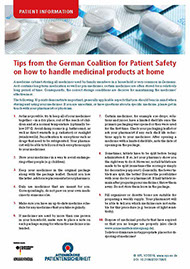
A medicine cabinet storing all medicines used by family members in a household is very common in Germany. As it contains long-term medication as well as prn-medicines, certain medicines are often stored for a relatively long period of time. Consequently, the correct storage conditions are decisive for maintaining the medicines’ effectiveness.
This 10 points demonstrate important, generally applicable aspects that you should bear in mind when storing and using your medicines. If you are uncertain, or have questions about a specific medicine, please get in touch with your pharmacist or physician.
In these guidelines, we offer advice to help you find the right application for you. At the end of each section, we have summarized the key facts. This checklist is intended to help you in choosing and using health apps. The idea is not to just tick all or a minimum number of boxes since these guidelines do not provide an evaluation of the medical utility or scientific accuracy of the information or recommendations provided by health apps. Under no circumstances should an app replace personal medical advice because only your doctor or therapist can evaluate which treatment is right for you.
In these online checklists, we have summarized some key facts to help you weigh up the risks and benefits associated with using health apps on mobile devices such as tablets, smart phones or wearables and also give tips for the safer usage of such apps.
Available in english, french, german and italian
English – Checklist for the use of health apps
Deutsch – Checkliste für die Nutzung von Gesundheits-Apps
FRANÇAIS – Check-list pour l’utilisation d’applis santé
Italiano – Lista di controllo per l’utilizzo di app per la salute
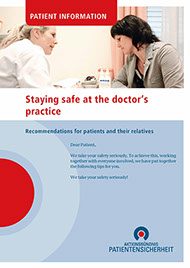
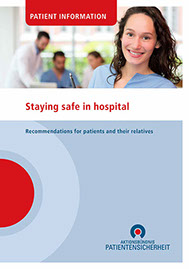
The more you participate in the decisions affecting your treatment, the safer your treatment during your hospital stay will be
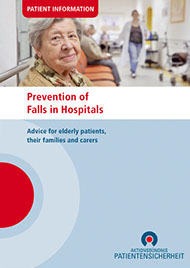
Falling is common for elderly patients and can have serious consequences. They frequently involve pain, injuries, fear of falling again and a feeling of insecurity. Your safety is important to us!
In this brochure you will find out how you can contribute to preventing falls in hospitals.
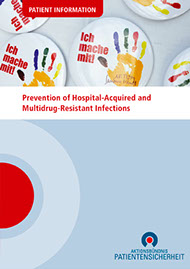
While there are many diverse patient-oriented education resources on multidrug-resistant germs (MDR-G), there is little information on hospital-acquired infections
– caused by susceptible or resistant germs
– that should be the focus of prevention approaches.
Based on recent research, this brochure gives you all the tips, information and background knowledge you need as a patient or relative to help prevent hospital infections. Every year, an estimated 80,000 to 180,000 preventable infections occur in German hospitals, about 1,500 to 4,500 of which with fatal outcomes. While the bulk of the measures needed to prevent these infections are for the hospitals and doctors’ surgeries to take, you and your relatives can effectively protect yourselves while staying at a hospital.
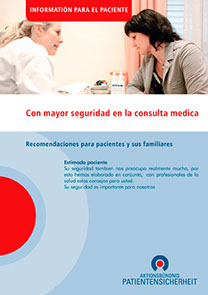
Recomendaciones para pacientes y sus familiares. Estimado paciente. Su seguridad tambien nos preocupa realmente mucho, por esto hemos elaborado en conjunto, con profesionales de la salud estos consejos para usted. Su seguridad es importante para nosotros.
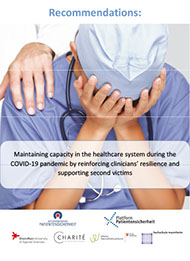
This has never been so clear as during the corona crisis. Infection prevention alone is not enough. Employees need to be protected in many ways: in their commitment to caring for patients, in decisions that need to be made, with regard to their physical and psychological stress.
Health Worker safety is patient safety!
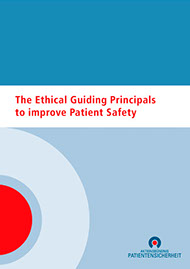
The Aktionsbündnis Patientensicherheit e.V. (APS) strives to improve patient safety and encourages active participation from every organization. To ease participation in our common movement, we developed Ethical Guiding Principals to improve Patient Safety. These Guiding Principals are developed for all who are actively involved in health care on all levels of resposibility, and resultantly have a strong influence on patient safety.
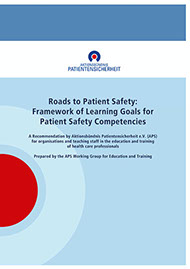
A Recommendation by Aktionsbündnis Patientensicherheit e.V. (APS) for organisations and teaching staff in the education and training of health care professionals Prepared by the APS Working Group for Education and Training

Elderly people are increasingly at risk of falling, particularly in hospitals. Many safety hazards are located in the patient‘s immediate spatial environment. In addition to assessing the risk of falls, every hospital employee can contribute to minimising the patients‘ risk of falling by considering the questions below which refer to the most frequent safety hazards.
All professional groups which might be present in a patient‘s room should be trained on the issues listed below. In this respect, it is highly recommended to involve the cleaning staff and the transport service in such a training.
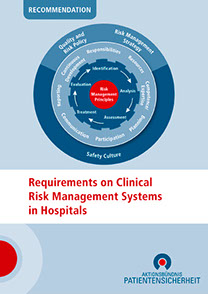
Clinical risk management in hospitals and rehabilitation clinics comprises the totality of the strategies, structures, processes, methods, instruments and activities used in prevention, diagnosis, therapy and nursing care, that support staff at all levels, functions and professions in recognising, analysing, assessing and handling risks in patient care, so that the safety of patients, of those involved in their care and the organisation itself is increased.